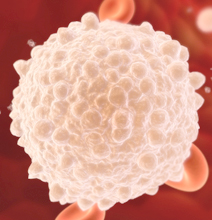Gene therapy
This idea behind this type treatment is to manipulate genes to treat cancer.
There are several strategies currently being researched, including:
- Replacing missing or mutated genes that increase the chance of cancer, by healthy functional ones. It is known that missing some genes, such as the tumor suppressor gene p53, can trigger cancer. Inserting functional copies of the genes in the cancer cells might be enough to treat the disease;
- Boosting the immune system’s ability to attack and destroy cancer – e.g., by introducing genes in white blood cells – a central player in the immune response against cancer - to increase their efficiency at recognizing and killing cancer;
- Turning cancer cells more susceptible to conventional treatments, such as chemo or radiotherapy, or the patients’ normal healthy cells more resistant. These more robust cells, once reintroduced into the body, can help improve the patient’s health and general resilience;
- Introducing “suicide” genes into the tumor cells leading to their self-destruction. E.g., genes able to activate toxic drugs, which are then delivered inactive to the tumor cell (this assures that healthy cells encountered on the way to the tumor are not affected by the drug);
- Introducing cell-killing viruses modified to be specific for cancer cells (so innocuous to healthy/normal cells).
But how are all these laboratory-manufactured genes put into cells?
Typically, new genes are inserted into cells using viruses. This takes advantage of the fact that when viruses infect cells, they add their own DNA into the attacked cell’s DNA.
So first the artificial gene(s) is inserted into the viral DNA, and then this modified virus is used to infect the cells we want to alter. As these cells become infected, their DNA acquires both the viral DNA and our lab-made genes. Crucially, the viruses used as vectors are altered so they cannot cause disease, at most, only some mild flu-like symptoms.
Furthermore, recently, there were major advances in the gene therapy field.
First, a breakthrough new technology called CRISPR, which works as a cutting sewing kit for genes, was discovered. CRISPR is now the most simple, versatile and precise method of genetic manipulation available, and is expected to quickly replace more traditional methods.
In another major breakthrough in August 2018 the FDA approved the first gene therapy against cancer, Kymriah (tisagenlecleucel), to be used pediatric and young adult patients with a form of acute lymphoblastic leukemia (ALL).
The treatment engineers the patient’s own white blood cells to recognize and attack a protein present mostly in his/her cancer cells, and will be used to treat young adults and children with advanced aggressive leukemia. In clinical trials, the treatment achieved, after only 3 months, complete or partial remission of 83% of patients resistant to chemotherapy.
The FDA has also approved a second gene therapy, based on the same mechanism as Kymriah to treat adult patients with large B-cell lymphomas who have not responded to other treatments or have relapsed after at least two different kinds of therapy.
Although there is yet no genetic therapy to treat colorectal cancer, its cells show specific genetic changes, such as high levels of microsatellite instability (MSI) that can be used as cancer ‘"markers," for example, to be detected by genetically engineered immune cells.




